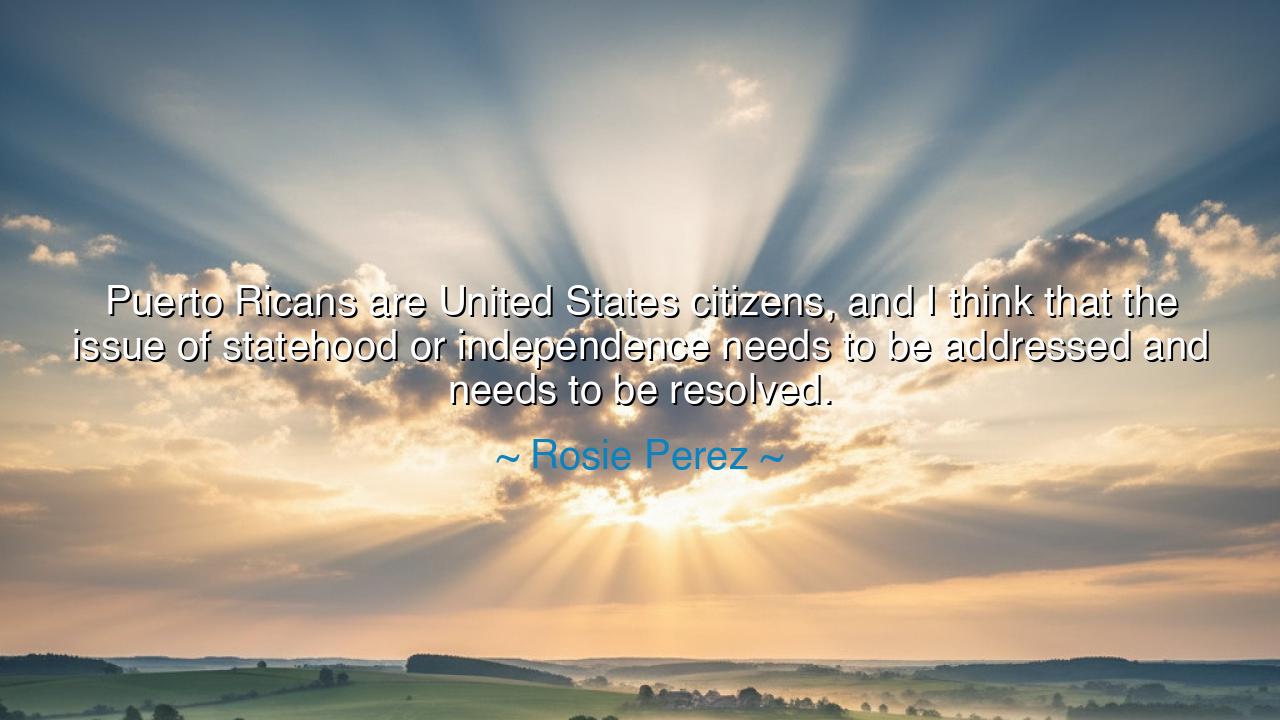
Puerto Ricans are United States citizens, and I think that the
Puerto Ricans are United States citizens, and I think that the issue of statehood or independence needs to be addressed and needs to be resolved.






“Puerto Ricans are United States citizens, and I think that the issue of statehood or independence needs to be addressed and needs to be resolved.” Thus spoke Rosie Perez, the artist and advocate whose voice carries both the weight of history and the yearning of her people. In her words lies not a mere political statement, but a cry for clarity, for dignity, for the healing of a question that has lingered across generations — the question of identity, belonging, and freedom. For more than a century, the island of Puerto Rico has stood suspended between two destinies, neither fully independent nor fully united. And in that uncertainty, the spirit of a nation has endured — proud, patient, but restless for resolution.
To understand her meaning, one must journey back to 1898, when Puerto Rico, once a colony of Spain, was seized by the United States at the close of the Spanish-American War. The island’s people, long accustomed to foreign rule, found themselves again under another flag — promised liberty, yet denied equality. In 1917, the Jones-Shafroth Act granted them U.S. citizenship, but not the full rights of citizens. They could fight in American wars, but could not vote for the president who sent them. They could be governed by U.S. law, but had no voice in shaping it. Thus began the strange half-life of Puerto Rico — a land both within and without, bound to the United States by law but set apart by status. It is this unfinished story, this unhealed contradiction, that Perez calls upon her nation to confront.
Her words reveal a deeper truth about the human heart — that no people can live forever in ambiguity. Citizenship without equality is a wound disguised as a gift, and belonging without representation is a burden cloaked in affection. Puerto Ricans have built their lives in the crossroads of cultures: American in passport, Latin in soul, Caribbean in rhythm and resilience. They have contributed to the military, to music, to sport, to science — shaping the nation that does not yet fully embrace them. Perez’s declaration is not a demand for one outcome, but for resolution, for the courage to decide at last whether Puerto Rico will be state or sovereign, partner or peer, child or equal.
The ancients understood the peril of indecision. A city divided against itself, they said, cannot endure. When Athens refused to resolve the question of citizenship for its allies, its empire collapsed under the weight of mistrust. Likewise, when a people live in uncertainty, their unity erodes, and their destiny drifts. Perez’s wisdom, though clothed in modern speech, carries the same eternal insight: that a nation must face its truth or be ruled by hesitation. To leave Puerto Rico in political limbo is to deny not only its people’s right to self-determination, but also the moral clarity of the larger republic that claims them.
Consider the story of Pedro Albizu Campos, the Puerto Rican nationalist who dedicated his life to the cause of independence. Educated in the United States, fluent in its ideals, he returned to his homeland to find those ideals only partially applied. For his defiance, he was imprisoned, yet his voice still echoes through history — proclaiming that no man or people can truly love another if they are denied respect. And yet, alongside him stand those who have fought for statehood, believing that equality lies not in separation but in full inclusion. Between these two dreams lies the tension Perez speaks of — the desire to belong without surrendering identity, to be free without forsaking connection.
Her words, then, are not of rebellion, but of reconciliation. She calls not for division, but for decision — for a nation, and for a people, to act with honesty and courage. “It needs to be addressed and resolved,” she says, for neglect is the slowest form of injustice. A question ignored becomes a scar across generations. For the children of Puerto Rico — and indeed for all who live between worlds — clarity is not a luxury, but a necessity. To know who you are is to know how to stand, how to build, how to dream.
And so, my child of the islands and the world, let this truth settle in your heart: freedom is not the absence of bonds, but the freedom to choose them. Whether the path leads to independence or to statehood, let it be chosen not by politics alone, but by wisdom, by courage, and by love of justice. No people should live as guests in their own story. If you are called to lead, to vote, or simply to speak, do so with the knowledge that silence sustains the chains that speech can break.
For as Rosie Perez reminds us, the time for waiting has passed. The soul of a people cannot remain forever in suspension. Puerto Rico, with its music and its memory, its storms and its sun, must be allowed to complete its journey — to stand not in the shadow of indecision, but in the full light of self-determined destiny.






AAdministratorAdministrator
Welcome, honored guests. Please leave a comment, we will respond soon